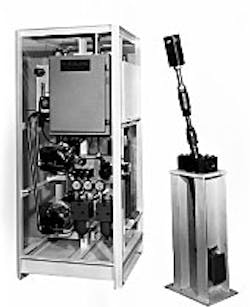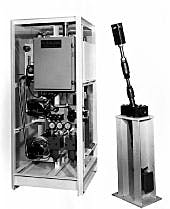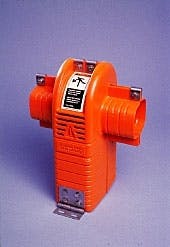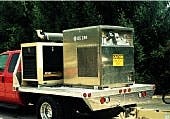Equipment/Software/Literature
New boiler draft control actuator
A new boiler draft control actuator helps increase burner efficiency and prevent boiler implosions on burner failure.
The actuator can be applied to any furnace operation in the oil industry.
Features include high speed operation-5 sec full-stroke, with frequency response of 3 hz minimum; accuracy of
Source: M.E.A. Inc., 2600 American Lane, Elk Grove Village, IL 60007.
New rotating shaft guard
A full line of standard trim and fit rotating shaft guards is made from high-density polyethylene plastic and is supplied with all stainless steel hardware. After initial sizing, guards are simply trimmed to length and height using three easy measurements and convenient trim lines (patent pending). Typical installation takes less than 1 hr using common power and hand tools, the company says.
Guards come in a solid safety orange color with affixed ANSI Z535.4 warning labels and fully enclose the rotating members, allowing gaps no greater than 6 mm. The guards are hinged and swing open for convenient coupling lubrication, inspection, and maintenance.
Source: Orange Peel LLC, 2237 Washington Ave., Cedarburg, WI 53012.
New system improves pump seal efficiency
Positive sealing of ANSI, process, and API pumps in toxic, harsh, and critical process applications is promised via a new fluid reservoir system.
Systems were developed specifically for use in chemical and petrochemical processing, refinery, and other process applications that use fluid barrier systems to deal with toxic, critical, or harsh liquids under tough conditions.
Typically, a fluid barrier system is connected to a dual seal to form a barrier that keeps process fluids in the pump, away from the environment.
Once installed, the system functions as a seal support system to help improve the sealing environment and promote long service life while preventing emissions from entering the atmosphere.
If a seal should fail, pressure on the reservoir forces the liquid into the process fluid or into the reservoir, not into the environment. A liquid-level switch notifies of the failure and shuts down the processing equipment. It also helps maintain a thin film of liquid between stationary and rotating seal faces, which serves as a lubricant to prevent problems before they occur.
Source: Flex-A-Seal, Box 184, Essex Junction, VT 05453-0184.
Process that aids diesel yield available for licensing
The new HyCycle Unicracking process, an advanced hydrocracking process for maximizing the yield of high-quality diesel fuel, is available for licensing.
Up to 5 vol % more middle distillate yield with as much as a 15% shift toward diesel fuel can be achieved when compared to other full-conversion designs, the company reports. This shift in selectivity, coupled with a more selective saturation of feed aromatics, results in as much as a 20% reduction in process hydrogen requirement. Another feature of the process is reduced operating pressure, typically 25% lower than other designs.
The process uses a combination of several patented design features, including an enhanced hot separator, back-staged series flow reactors, and a novel split-wall fractionator configuration to achieve its results.
Source: UOP LLC, 25 E. Algonquin Rd., Des Plaines, IL 60017-5017.
Unit sprays ice particles to clean any surface
The ICE 250 machine has been redesigned into a hazardous duty unit,
to meet Class 1, Division 1, Groups C and D. This system uses UL approved parts. This unit is also available in a nonhazardous use configuration.
The machine produces and sprays small ice particles from clean water. The spray of ice particles, with the aid of high air pressure, cleans virtually any surface without damaging underlying substrate, the company points out.
The machine:
- Uses 25 gph or less of clean water.
- Cleans production equipment without extensive site preparation.
- Requires little cleanup after cleaning procedure is completed because of the small volume of moisture residue created; 30-60% of water evaporates upon contact
- Can be operated in remote and confined spaces.
Source: Ice Cleaning Systems Inc., 9595 Whitley Drive, Suite 107, Indianapolis, IN 46240.



